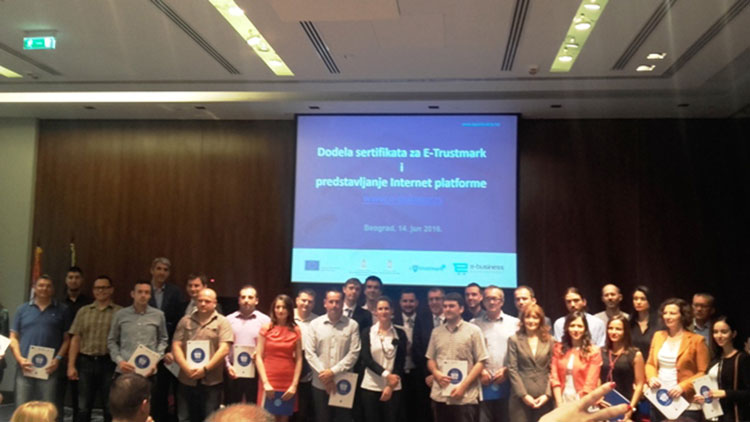Thirty five small and medium enterprises (SMEs) in Serbia have been awarded with E-Trustmark through activities of the EU-funded project E-Business Development. Goal of the project is to stimulate online e-commerce and thus the development of economy, but also to bring Serbia closer to EU standards. Next step is to set up a sustainable certification system in Serbia. In the meantime, the EU keeps developing standards and proposes new rules in order to prevent discrimination based on permanent residence and ensure better protection of consumers from frauds.
Oskar Benedikt Deputy Head of the EU Delegation to Serbia said that the introduction of standard in e-commerce would be beneficial for Serbian economy and its path towards the EU. He emphasized that, once the project is completed, it would be necessary to develop a sustainable certification system.
Benedikt stressed that the E-Business Development project was financed by EU tax payers to the tune of EUR2.5 million and recalled that the EU is the biggest donor to Serbia with EUR3 billion provided over the past 15 years and, counting donations from EU Member States, the financial assistance grows to EUR4.5 billion.
Deputy Head of the EU Delegation said the EU proposed amendments to rules in order to stimulate cross-border online commerce added that 350 million people in the Union use the Internet on daily basis, but only 15 percent of the population shops online from abroad.
The European Commission proposed rules designed to tackle three aspects of e-commerce: ban all unjustified forms of geo-blocking, high delivery costs and control strengthening.
The European Commission proposes ban of discrimination based on permanent residence, the so-called “geo-blocking” such as automatic redirecting to a country-specific web-site as well as imposing limits and changing conditions depending on the country of residence. As Benedikt put it, offline retailers do not ask for documents in order to set conditions for purchase so online shops should not be doing it either.
According to Benedikt, delivery costs tend to be a huge barrier and in case the goal of reducing them is not achieved through proposed measures, Brussels does not preclude the possibility of stipulating maximum delivery charges. Limits regarding costs of phone call and data transfer have already been introduced and as of 2017, roaming tariffs in the EU will no longer vary from country to country.
European Commission proposal also envisages strengthened control of national regulatory authorities which would allow them to take down fraudulent web-sites, monitor the observance of purchase withdrawal rule as well as rules on obtaining data on consumers from banks and registers if necessary.
State Secretary at the Ministry of Trade, Tourism and Telecommunications Vesna Kovac emphasized that for consumers in Serbia, the main barrier for e-commerce is the fear, that someone would take their personal data on the Internet or their credit card numbers. As another problem, she cited the lack of initiative and information among SMEs.
The data obtained in the survey conducted in October 2015 showed that about 35% of citizens in Serbia had experience in online shopping. Most of them, however, say they do not take risk of paying online due to lack of trust. More than half of the respondents, about 59%, say they would not know whom to file a complaint if a problem occurred.
Leszek Jakubowski Project Team Leader told EurAktiv that goal of the project was to reach European standards of e-commerce. There is no single e-commerce trust mark in the Union, but there is an association which guarantees that the standards are met.
“It is now up to Serbian organisations to make a move. An association or any other similar body should take over the responsibility of issuing E-Trustmark certificates. Once this body takes over the certification, it would naturally start cooperating with the EMOTA which authorises national organisations in EU Member States to issue this certificate,” Jakubowski said.
The companies awarded with E-Trustmark will now display the logo on their web-sites. These marks are titled E-Trustmark, meaning a mark of trust in e-commerce. E-Trustmarks issued within the project will be valid through November 2017. Businesses and consumers can seek more information on the eposlovanje.biz web-site.
Business activities of the SMEs and entrepreneurs awarded with certificates are diverse and include publishing companies, baby equipment retailers, retailers of bedding and similar products, appliances and electronic devices shops, travel agencies, as well as a flower shop.




